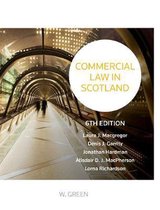Lecture 1 – Law of Agency
Contents
Law of Agency ....................................................................................................................................... 1
Types of Agent ...................................................................................................................................... 2
Creation of Agency................................................................................................................................ 3
Agent’s authority .................................................................................................................................. 8
Agent’s Duties ..................................................................................................................................... 11
Agent’s Rights/Principal’s Duties ........................................................................................................ 14
Agent Acts as an Agent ....................................................................................................................... 15
Law of Agency
Who is an ‘agent’?
Davidson and MacGregor notes that an agent is
“a person who has authority to act for and on behalf of another (called the principal) in contracting
legal relations with third parties; and the agent representing the principal creates, alters or discharges
legal obligations of a contractual nature between the latter and third parties.”
Any person who is acting as an agent needs authority from the Principal. The question is how that
authority has been given. That authority can be expressed in writing or by word of mouth, implied (the
person has been dealing with you and you say it is fine) and could be apparent (considered by others
and never been objected by the company) or ostensive authority. Third parties have been considering
you as an agent and the principal has never objected.
An agent has the authority to enter into transactions with third parties on behalf of the Principal and
that authority creates new obligations, can change create and terminate what has been going on, and
also the authority to act on behalf of the company.
In effect, there are two contracts in agency, one between the agent and the principal, and one
between the principal and the third party. Normally, but not exclusively, the agent is rewarded by
means of a commission or a fee from the principal.
Common agency arrangements
• estate agent and client – agent of the client to sell or buy
• solicitor and client – acting as an agent for the client
• director and his company, agent of a company, holding the company and all the transactions
made are on behalf of the company. – director is an agent of the company, he is holding his
office and all the transactions he has done are in the name of the company.
1
, • a partner and his partnership – he is an agent of a partnership.
• insurance broker and an insurance company
• car dealer and his supplier
• sports agent and player
Types of Agent
• General agent
A general agent is an agent who is employed to carry out all of the business of a particular
Principal, or at least, all of the business of the Principal of a particular kind.
Normally, third parties will be able to assume that a general agent has all the powers that an
agent of that kind would normally have.
• Has been given the authority to deal with all the business of a particular principal, or deal
with all of the business of the Principal of a particular kind. Power to deal with all the
transactions of the company (wider authority). Solicitor who has been dealing with the
Conveyancing, can do everything within authority when dealing with a particular
property.
• A family solicitor who looks after all the legal affairs for a family would usually be treated
as a general agent.
• Special agent
A special agent is employed by the principal to carry out one particular transaction or piece
of business.
• Where you have appointed someone, who has been acting for you to carry out a particular
transaction/act.
• The authority is limited just related to that transaction.
• A solicitor appointed by a new client to look after a single transaction could be considered
to be acting as a special agent.
• Factor
• They have mostly been used to sell the property of the company. A kind of agent who
takes the possession of the goods and they sell them for you.
• Del credere
• Not common nowadays. They are the agents who for the Principal in any of the
transactions, but they give a guarantee to the Principal for the performance of the
obligations by the third party. They sell goods as agents and guarantee the Principal that
payment would be made by the company. Give assurance that the company will make
payment. That would be done because the liability would be taken by the agent who
would get the commission.
2
, • Commercial Agents (under the Commercial Agents (Council Directive) Regulations
1993/3053).
Commercial agents are self-employed, intermediates, who have the authority to negotiate
and they have continued authority to complete transactions with third parties.
For example, you have an agent who has the authority to sell goods (he does not sell services
but only goods) because of the nature of the contract now they have the right of fair
termination and compensation if the contract is completed very quickly. Only dealing with
agents who sell goods.
Agency and Mandate
Where the relationship is gratuitous the term “mandate” is used rather than “agency”. The mandant
is the equivalent of the principal and the mandatory the equivalent of the agent.
Capacity
Some principals may not have legal capacity (such as a child of non-age – Age of Legal Capacity
(Scotland) 1991) and cannot appoint an agent.
The Principal must have legal capacity first before appointing an agent to act on the behalf of the
Principal.
A principal who lacks contractual capacity cannot resolve this problem by employing an agent who
has contractual capacity.
There are a few exceptions, otherwise there has to be legal capacity in order to enter into a contract.
The agent’s lack of capacity does not threaten the formation of this contract. There is nothing under
the Scottish law that the agent needs to have legal capacity.
Creation of Agency
A contract of agency need not be constituted in writing, though commercial agents are entitled to
obtain from their principals, and principals from their agents, a statement of the terms on which they
will do business with each other.
For a contract of agency to exist, the parties must have legal capacity and must exist. Where the
principal does not exist, but legal obligations arise, as in a contract made by a director of an as yet
unformed company, the purported agent will themselves be liable for the obligations arising out of
the contract unless the contract says otherwise.
Phonogram Ltd v Lane
Lane borrowed money to set up a company, which was going to manage a pop group called “Cheap,
Mean and Nasty”. He never got round to founding the company. The lender asked for their money
3





